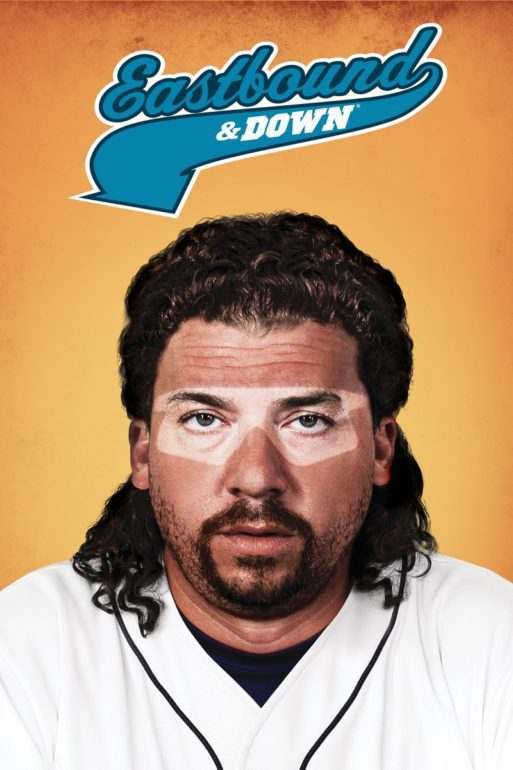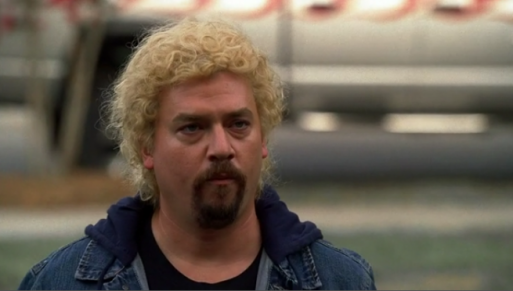 If you’re a fan of Eastbound & Down, then you know what happened two weeks ago: Kenny Powers died and then he didn’t. In the Season 3 and series finale, we watched as Kenny (played by Danny McBride) finally made it to the majors, accomplishing his dream as a pro baseball player. Among the other highlights were Matthew McConaughey’s raunchy pregame pep talk, Kenny’s breakup speech in a college biology class, and Stevie’s mop of a wig complemented by his fake eyebrows. These moments are undeniably memorable, but none compare to the alternate ending in which Kenny comes back from the dead with bleach blonde hair.
If you’re a fan of Eastbound & Down, then you know what happened two weeks ago: Kenny Powers died and then he didn’t. In the Season 3 and series finale, we watched as Kenny (played by Danny McBride) finally made it to the majors, accomplishing his dream as a pro baseball player. Among the other highlights were Matthew McConaughey’s raunchy pregame pep talk, Kenny’s breakup speech in a college biology class, and Stevie’s mop of a wig complemented by his fake eyebrows. These moments are undeniably memorable, but none compare to the alternate ending in which Kenny comes back from the dead with bleach blonde hair.
It seems like a great departure from many previous Eastbound episodes that killed off characters abruptly and with abandon. As many of us remember, Kenny’s friend Shane unexpectedly dies of a coke overdose in season 3, episode 3, to the sound of “Walk Like an Egyptian.” Nothing in the episode leading up to that fatal scene would have suggested such a sobering end. But then again, like several other episodes, the running theme seems to be a series of funny moments swiftly brought to an end by one much more serious. The premiere of this season certainly played out that way. After a night of carefree fun with April, Kenny wakes up to find she’s taken off and left him with their one-year-old son. As he looks around his disordered home, the baby cries in the background and somber music closes out the scene.
Even the finale began with a death. I’m sure most people watching were excited to see Seth Rogen make an appearance in the opening shots as a pro pitcher at a Texas bar. Only moments later, we see him hit by a bus and killed while pouring his heart out to some unsuspecting girl. And yet, that doesn’t seem surprising for a show like Eastbound, a show that’s embraced death as an essential element of life all along.
As Kenny’s gearing up to throw his third and final pitch to win the game and cement his dreams, he goes into a remarkably poignant speech, saying, “That was the moment I realized I’d finally achieved everything I worked so hard for, despite the countless obstacles and adversities I’ve faced along the way. It was that exact moment when I looked into that batter’s eyes and I saw stone-cold, childlike fear. For the first time in so many moons, I thought I was in total control. I held my own destiny in my hands as sure as I held that baseball.” And in that sense, isn’t that what we’re all looking for? Some sense of control?
Kenny’s death represents the truth that everything must come to an end. By adding that last scene in which he comes back from the dead to start a new life as a family man, HBO almost preserves his character, making the old episodes easier to re-watch knowing he’ll make it in the end. While I think the first ending has more truth, the second strokes our own human insecurities. We are inevitably comforted by the idea that his character could live on, if only in our own minds. After getting to know a character over the course of several seasons, it becomes difficult to let them go. That brings me back to my initial question: what does it say about us if we cannot stand the thought of killing off a great character?

 “Eastbound and Down” by Ben Best, Jody Hill, and Danny McBride
“Eastbound and Down” by Ben Best, Jody Hill, and Danny McBride



 First the Wealth Gap, Now the U.S. Has a Growing Health Gap
First the Wealth Gap, Now the U.S. Has a Growing Health Gap
 How to Comfort A Dying Loved One
How to Comfort A Dying Loved One
 Our Annual Seven Holiday Gifts for Someone Who Is Grieving, 2024 Edition
Our Annual Seven Holiday Gifts for Someone Who Is Grieving, 2024 Edition














